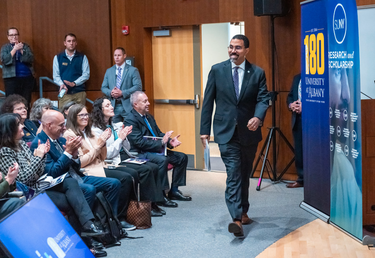‘We have to be bold’: UAlbany unveils AI supercomputer
— Photo from govkathyhochul
John B. King Jr., chancellor of the state’s university system, is applauded on Thursday at the unveiling of the University at Albany’s supercomputer. King has said that the university-wide AI Plus Initiative will “solidify our position on the world stage and ensure any student can get a proper grounding in these paradigm-shifting technologies.”
The University at Albany on Oct. 10 unveiled what it called “one of the most advanced AI supercomputers at a U.S. university.”
Comparable to AI computers being used for profit in the private domain, this is part of a larger state initiative to use the technology for public good, Governor Kathy Hochul said.
The new artificial-intelligence system is housed at UAlbany’s uptown campus and is central to the university’s AI Plus initiative.
That initiative, the university’s website explains, is a philosophy rather than a program; it has three components.
One is on academics “to ensure every graduate is prepared to live and work in a world radically changed by technology in the coming decades.”
The second is on research, which involves the AI Plus Institute, a hub connecting researchers across the SUNY system. Twenty-seven new faculty members will be affiliated with the institute, as will the many existing faculty already using AI technology in their work.
“The Institute’s mission,” the university says, “is to cultivate interdisciplinary research collaborations that will open new avenues of discovery, maximize extramural research funding, seed industry partnerships, and create high-impact undergraduate and graduate research opportunities for students focused on artificial intelligence and its many applications.”
The third component is hardware and computing: The Center for Emerging Artificial Intelligence Systems is a cluster at UAlbany to expand its supercomputing capacity through a $20 million joint venture with IBM, later to include NVIDIA so that “faculty, staff and students have access to some of the most innovative and powerful hardware available.”
Hochul was on hand for Thursday’s unveiling.
“The world is in the midst of one of the most important races in human history,” she told the assembled crowd. “It’s a race for knowledge, wealth, prosperity, and power.”
The state awarded $75 million to UAlbany — half of it for a new downtown engineering center and the other half toward expanding UAlbany’s AI supercomputing capacity.
“We know why superpowers like China are working overtime to dominate and build the next generation of supercomputers capable of making mass technological strides,” Hochul told the crowd. “But here in the United States, those supercomputers also exist.
“And until today, they had been in the hands of private companies: OpenAI, Google, Microsoft. Imagine all the good that can be done when that same power is in the hands of institutions like University at Albany, dedicated to the public good….
“And their objective is not to make money off of this; their objective is to foster progress for mankind, womankind, and to innovate, to be creative, to learn and improve society and the human condition. If we can solve problems that are affecting people right now, if we can use this as that tool, what an extraordinary place we will be.”
Hochul said that the Empire AI initiative is a $400 million public-private consortium that will involve other places across the state with another supercomputer at the University of Buffalo.
“The [Interstate] 90 corridor from Buffalo all the way through Albany, and other parts of our state are going to be beneficiaries as we try to create the supply chain to support the $100 billion investment,” Hochul said, referencing Micron Technology’s plans to invest up to $100 billion over the next 20 years to construct a semiconductor fabrication facility in Onondaga County.
The day after the Oct. 10 unveiling at UAlbany, the governor was in Buffalo, announcing that the Empire AI Consortium will commence research this fall, with a jumpstart from a Simons Foundation contribution.
The consortium includes seven New York-based founding institutions: Columbia University, Cornell University, New York University, Rensselaer Polytechnic Institute, the State University of New York, the City University of New York, and the Flatiron Institute.
Funding of over $400 million in public and private investment includes a $250 million state capital grant investment, and $25 million over 10 years in SUNY funding. The project will also receive over $125 million from the founding institutions and other private partners, including the Simons Foundation, whose Flatiron Institute works to advance research through computational methods.
Stony Brook University’s Robert J. Harrison will lead the consortium while a national search is conducted for a permanent leader.
The consortium is to advance research aimed at addressing major societal challenges for the public good, according to the announcement from the governor's office. “These efforts will focus on critical areas such as climate change and resilience, health disparities and interventions, accelerating drug discovery, democratizing education for all populations, and tackling global food insecurity and urban poverty,” the announcement said.
It also said that Empire AI is to play a “pivotal role in solving other complex issues, including sustainable energy solutions, cybersecurity threats, advanced health care diagnostics, equitable economic development, and optimizing infrastructure for smart cities.”
At the UAlbany event on Oct. 10, the focus was on all the good AI could do with hardly a mention of some of the many concerns, including amplification of societal biases, lack of transparency, risks to privacy and security, job displacement, loss of creativity and critical thinking skills, promotion of misinformation and manipulation, and loss of human connection and control.
Briefly addressing concerns about AI, Hochul said, “The fear of misappropriation should not be something that holds us back, because the good will so outweigh any negativity around it. And that’s what we have to be bold and lean hard into — when others are stepping back, we step in,” the governor said.
Hochul referred to the chancellor of the state’s university system, John B. King Jr., who also spoke at the event, as a visionary.
King says, in a video on the AI Plus Initiative site, that it will “solidify our position on the world stage and ensure any student can get a proper grounding in these paradigm-shifting technologies.”
UAlbany’s president, Havidán Rodriguez, who also spoke at the event, says in the video, “We wanted to provide the resources in terms of the faculty but also in terms of the technology in order for us to move forward.”
Rodriguez concludes, “Our goal is having our students become engaged global citizens by using this technology, this knowhow, and this expertise to transform the world.”
“For us to hit real-world problems,” says the university’s vice president for research and economic development, Thenkurussi Kesavadas, in the video, “we really need to invest in the computing that is comparable to what is available in the private domain. So we decided, let’s focus on building a computer system here which is second to none ….
“Researchers can take a real-world problem and do machine learning and come up with solutions in a week’s time perhaps, right, which we couldn't do before.”
Kesavadas concluded, “Most importantly, it gives students the power to use our AI computing to help people.”



